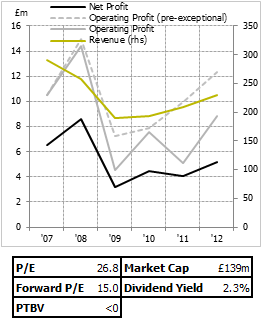 Communisis (LON:CMS) are a business engaged in, ostensibly, a very boring activity. You might argue it's become more interesting in the last few years; they went from being a company mostly involved in the printing of cheques and direct mail to a more 21st Century provider of 'communication services'. They talk about integrating with their customers, providing bespoke solutions and about investing in higher quality printing methods - they made a big deal of acquiring an enormous high-tech printer a while back. Fortunately, both for us and them, the picture they paint of themselves isn't an entirely typical rose-tinted management view of the business; it is slowly being borne out in the figures. Margins are on an upward trend, the contracts they are winning seem to be tilted towards the more value-added end of the spectrum, they're closing older (and more standardised) sites and - perhaps most importantly - their higher margin segment is claiming an increasingly large share of group revenues.
Communisis (LON:CMS) are a business engaged in, ostensibly, a very boring activity. You might argue it's become more interesting in the last few years; they went from being a company mostly involved in the printing of cheques and direct mail to a more 21st Century provider of 'communication services'. They talk about integrating with their customers, providing bespoke solutions and about investing in higher quality printing methods - they made a big deal of acquiring an enormous high-tech printer a while back. Fortunately, both for us and them, the picture they paint of themselves isn't an entirely typical rose-tinted management view of the business; it is slowly being borne out in the figures. Margins are on an upward trend, the contracts they are winning seem to be tilted towards the more value-added end of the spectrum, they're closing older (and more standardised) sites and - perhaps most importantly - their higher margin segment is claiming an increasingly large share of group revenues.
'Slowly' is something of a key word here; by virtue of the sort of stuff they do - handle customer communications and printing services - Communisis runs fairly long contract times, and even longer customer relationships. A significant bulk of the work they do, I reckon, is still the bread and butter stuff. That's not a bad thing; customer relationships are valuable, after all, and doing the bread and butter stuff allows you opportunities for cross-selling. That potential seemed to be exemplified this week, when Communisis announced another contract win with Lloyds, a half year after their first - itself a big deal since it represented the 'largest contract of its kind in the UK'. Management are, as usual, a bit light on the details - I suppose for corporate confidentiality reasons - but we have at least a few hints. They're taking on '14 existing sites' in the UK, for instance, and '310 roles will transfer to Communisis under TUPE arrangements'. TUPE - for those who don't want to Google it as I had to - is the maintenance of existing staff contracts when the operator changes hands. I can only broadly guess with these figures - and I emphasise the broadly - but it does allow us to make some comparisons. We might, for instance, note that Communisis as a whole currently employs about…

.png)


